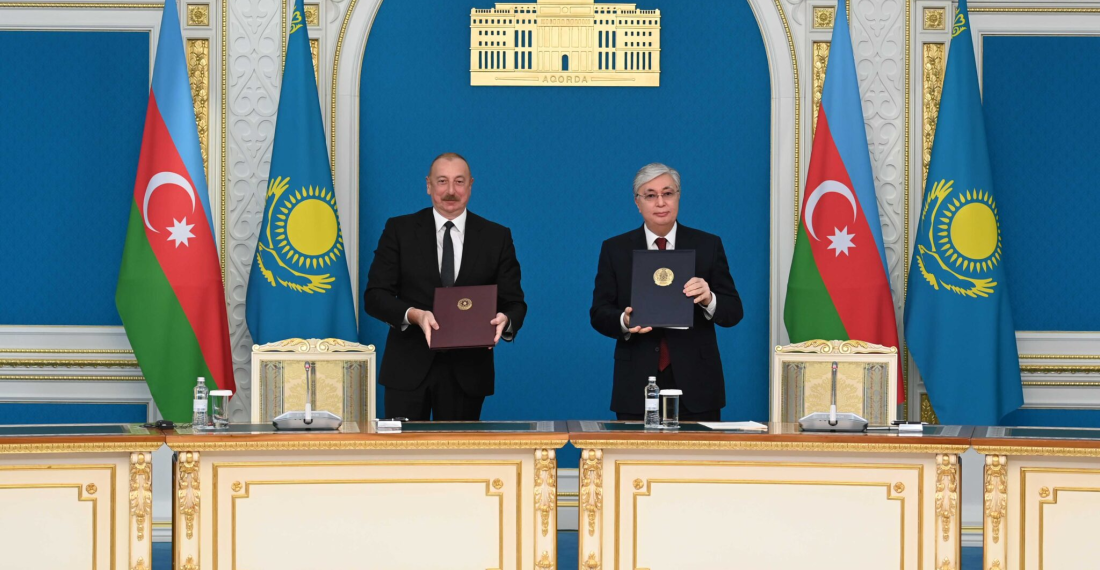Kazakhstan and Azerbaijan have agreed to significantly increase bilateral cooperation in a number of sectors after the President of Azerbaijan Ilham Aliyev met with his Kazakh counterpart Kassym-Jomart Tokayev in Astana on Monday (10 April).
The meeting was comprehensive, focusing on strengthening political, trade, economic, transport and transit, as well as cultural and humanitarian cooperation between the two Caspian Sea states.
The two presidents signed several memoranda of understanding on cooperation in sports, diaspora initiatives, science, telecommunications, business and culture.
President Aliyev and President Tokayev also signed a joint statement and protocol on the establishment of a Supreme Interstate Council, "which is designed to serve the comprehensive strengthening of bilateral relations", according to Tokayev.
Kazakhstan and Azerbaijan trade and economic partnership "far from being exhausted"
In his press statement, the Kazakh President said: "A series of new agreements signed today will give a further impetus to our multifaceted partnership. Kazakhstan and Azerbaijan cooperate on a mutually beneficial basis in the trade and economic sphere. We have noted with satisfaction that the turnover between our countries approached the half-billion mark last year. However, the potential of trade and economic partnership, of course, is far from being exhausted. We have agreed to take effective measures to further expand the range of export and import goods."
He added: "The full deployment of the potential of the Trans-Caspian International Transport Route, the so-called Middle Corridor, is of particular importance. We are talking about the improvement of logistical services, the creation of unified transport operators, the modernization of technical and tariff conditions, the elimination of administrative barriers and the emergence of a closed logistical cycle. The effective implementation of the roadmap for the development of the Middle Corridor for 2022-2027 is also of great importance."
Tokayev also stressed agreements and progress in investment across all sectors, trans-Caspian telecommunications, and culture.
Kazakhstan and Azerbaijan aim to reach $1bn bilateral trade
On his part, not wishing to repeat anything that President Tokayev had already said, the Azerbaijani President said that Azerbaijan is "truly determined to deepen and expand the multifaceted cooperation" with Kazakhstan. Aliyev added, "Brotherly relations with Kazakhstan are both an instructions from our ancestors and a vital necessity. Because the processes taking place in the Caspian region, in Central Asia and in the South Caucasus require us to strengthen cooperation in all directions, starting with issues related to regional security to those related to transport, logistics, energy, humanitarian cooperation, and ecology."
"We have also extensively discussed issues related to industrial cooperation, expansion of the range of export-import operations, including the issues of placing orders for realization of export-import potential in the future. Of course, we need to complement each other's infrastructure, each other's industrial potential through the goods we can supply to each other, thus increasing the turnover of goods. Today, figures were announced in order to increase our medium-term commodity turnover to a billion dollars," President Aliyev said.
At the end of press conference, President Aliyev extended an invitation to President Tokayev to visit Azerbaijan.
source: commonspace.eu with agencies
photo: AzerNews






